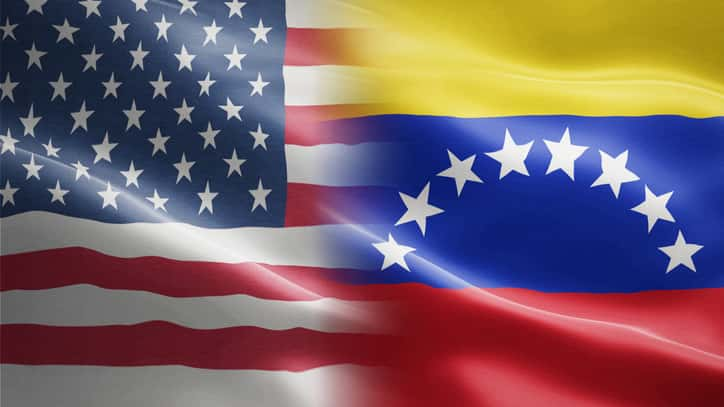
 twinsterphoto/iStock(WASHINGTON) — In a dramatic escalation of his administration’s pressure campaign against Venezuela’s Nicolás Maduro, President Donald Trump has imposed a full embargo on the socialist president’s government.
twinsterphoto/iStock(WASHINGTON) — In a dramatic escalation of his administration’s pressure campaign against Venezuela’s Nicolás Maduro, President Donald Trump has imposed a full embargo on the socialist president’s government.
The executive order, signed late Monday, freezes all Venezuelan assets in America’s jurisdiction and importantly allows the U.S. to impose sanctions on anyone doing business with Maduro.
The historic move puts Venezuela in the same category as North Korea, Iran, Cuba and Syria in terms of how much economic pressure and global isolation the U.S. is attempting to impose on it.
Critics say the move is a sign of the decision’s misdirection, as decades of similar embargoes have failed to change the governments or policies of Havana or Tehran.
But senior administration officials expressed optimism that it would quicken the demise of Maduro’s rule, seven months after the opposition-controlled National Assembly declared him illegitimate and named its president Juan Guaidó as the country’s interim leader. Despite that declaration and immediate support from the U.S. and eventually more than 50 other countries, Guaidó remains on the outskirts of power, with the military leadership still behind Maduro.
“We’re more optimistic that the peaceful transfer of power from the Maduro regime to Juan Guaidó can be achieved,” national security adviser John Bolton said Tuesday on the sidelines of the Lima Group meeting in Peru.
The 14-country group was created in 2017 to condemn Maduro for his ongoing crackdown on political opposition and his consolidation of power.
“This is the most sweeping executive order that we’ve made in connection with Venezuela in the last six months. It’s a very broad action with very broad implications,” Bolton added, in particular issuing a warning to Russia and China.
Along with Cuba, Iran and Turkey are Maduro’s closest allies and economic lifelines, but their government agencies, businesses and citizens will now be subject to possible sanctions for doing business with Maduro, his government and anyone associated with it. It’s unclear, though, whether the threat of these secondary sanctions will scare these countries off, which have long supported Maduro.
Since recognizing Guaidó as interim president, the Trump administration has levied successive rounds of sanctions on Maduro, including on Venezuela’s state-owned oil company and central bank. Bolton said there will be “additional steps” announced “in due course,” hinting at steps to cut off Venezuelan oil shipments to Cuba, which he said was “under very close study.”
There are exemptions made for humanitarian reasons, allowing U.S. businesses and citizens to continue to provide food, medicine and medical devices, personal remittances, and telecommunications or internet support.
Guaido voiced support for the measures, speaking to reporters in the Venezuelan capital, Caracas, “This is not against Venezuela. It goes against a regime, it goes against those who do businesses at the expense of the hunger of Venezuelans.”
But critics say these carve-outs will not do enough to help the Venezuelan people, who are suffering amid food and medical shortages, power blackouts, and hyper inflation. Mismanagement and corruption have plagued the Venezuelan system and brought a once-rich oil nation to its knees, according to analysts.
“We know how this ends: More suffering, more grandstanding, less diplomacy,” according to Alejandro Velasco, a Latin America historian at New York University. “At some point we have to realize and acknowledge these policies are having the opposite effect of what many imagined [or] hoped and become evil in their own way that can’t be excused away.”
Copyright © 2019, ABC Radio. All rights reserved.
